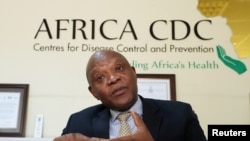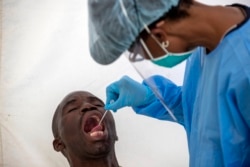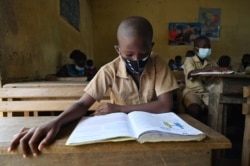As many African countries reopen, the head of the Africa Centers for Disease Control and Prevention urges widespread testing as the best way to avoid a surge in new cases of COVID-19.
Dr. John Nkengasong, director of the Africa CDC, said that to have a reasonably accurate picture of how the coronavirus is spreading, Africa needs about 15 million tests, or enough to test about 1% of the population. To date, only 1.8 million people have been tested continentwide.
“If we did not know our pandemic, we cannot fight the pandemic,” Nkengasong told VOA via Skype from his office in Addis Ababa. “It’s like we're at war. If you do not know your enemy, you can’t fight the enemy.”
In order to bridge the testing gap, the Africa CDC has created the Partnership to Accelerate COVID-19 Testing. The partnership will establish a platform for African countries to pool resources in order to buy diagnostic tools available on the international market. Nkengasong hopes the platform will go live in about a week.
To date, the Africa CDC has distributed about 2.7 million tests, including a planned distribution of about 900,000 tests in Senegal this week. Still, there are many blind spots that affect the accuracy of overall numbers, Nkengasong said.
“There are certain missing cases out there because our surveillance systems are weak, our current systems are weak. We are certainly missing cases there,” he said. “The real question is by how much. Are we missing it by a whole lot or are we missing it by a few cases here and there? So, as we increase our testing ability, we'll be able to answer that question. The concern that we have is: Is what we are not seeing going to harm us?”
There are vast differences in access to testing within the continent. South Africa has conducted about 30% of Africa’s tests even though it accounts for only 5% of the continent’s population, according to an analysis by Reuters. In some cases, African leaders such as Tanzanian President John Magufuli have questioned the accuracy of the tests.
Africa CDC Deputy Director Dr. Ahmed Ogwell told VOA’s English-to-Africa health reporter that the organization is seeking to acquire polymerase chain reaction (PCR) tests, which detect genetic material from the virus, rather than some other rapid tests that are less reliable.
“The Africa CDC is procuring test kits from manufacturers that have been vetted. And we are very confident that the test kits that we are distributing to Africa are a good quality,” Ogwell said. “They work, and we also follow up with the quality assurance. When tests are having problems, we know and we rectify.”
Africa has recorded a lower caseload than other parts of the globe, with about 119,000 cases of COVID-19 infection and about 3,500 deaths. However, in recent weeks new cases have been increasing at a rate of about 30% per week. One headline-grabbing example took place in Ghana earlier this month when more than 500 people tested positive in one day at a fish-processing factory.
“This suggests that we are on the increasing side of the slope,” Nkengasong said. “So we are not yet at the top of the slope or we are not decreasing. So I think that has to be put in context. And this implies clearly that we cannot be complacent.”
To combat this worrying trend, Nkengasong said the Africa CDC is leading an effort to recruit and train “1 million foot soldiers,” or people who can hit the streets to do contact tracing. He also stressed the need to expand health systems to meet the additional need and protect them from being overloaded.
“If we do not protect our health care workers, [the harm] that it may have on an overall ability to provide care for the community is huge,” he said. “And this includes the damage that it can cause to our HIV, malaria, tuberculosis and immunization programs. So these are all things that we must face, the challenges that we face across the board.”
Ogwell echoed this point, saying that battling coronavirus cannot come at the expense of providing other essential health services.
“We cannot afford to disrupt the normal health systems because it is a danger to society if we disrupt it. Then people will end up suffering and dying from other conditions and not just COVID-19,” he said. “So our advice to governments is to not stop the other health services. Continue with those. Designate special facilities to look after COVID-19 patients, and in the planning, other health services must still be at the core of the provision of health services.”
This story originated in the Africa Division with reporting contribution from VOA English-to-Africa's health correspondent, Linord Moudou.






